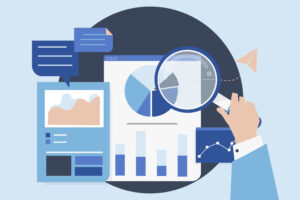Last year, the life sciences industry saw amazing progress in marketing. Companies were able to return to in-person conferences and trade shows. In addition, companies really levelled up their digital marketing game, with increased advertising and content production, as well as an improved online presence. These efforts paid off, as companies were able to reach and engage with their target audience more effectively. As we move into 2023, it is expected that the industry will continue to thrive and push the boundaries of marketing even further. Sciential’s experts have identified 5 trending digital marketing topics that life sciences marketers should focus on in 2023.
Educational Content for Demand Generation
Educational content is becoming more important in life sciences because it helps establish a company as a thought leader and expert in the field.
By providing valuable information and resources through e.g. webinars and white papers, a company can build trust and credibility with their target audience. Educational content also helps shorten the sale cycle as prospects will have a better understanding of your product or service.
Finding the Balance Between Organic and Paid Search Engine Marketing
Both organic and paid search approaches are effective to generate traffic or leads, but it is important to find the right balance between the two. Too much emphasis on paid search can be costly and may not provide the best return on investment while relying solely on organic search can take longer to see results. By balancing both tactics and diversifying, companies can outperform their competitors without exhausting their resources.
Audience Segmentation and Personalization in a Cookie-Free World
Audience segmentation and personalization can significantly improve conversion rates.
By dividing a prospective audience into smaller groups based on shared characteristics (e.g. level of interest or demographics) it is possible tailoring messages to their specific needs. Personalized marketing efforts can also help build a relationship between prospects and your company’s brand. In addition, the cookie-free world requires marketers to collect first-party data for their marketing campaigns. Starting this process will in time help personalize campaign strategies even more.
Integration of Omnichannel Touchpoints
In life sciences, many companies promote business-to-business products or services that may require a long sale cycle of one year or longer. It helps to be patient but an omnichannel strategy may even work better. Clients may find, see or engage with you on multiple channels and touchpoints, such as LinkedIn content, Google searches, email or display ads. The buyer’s journey (awareness, consideration and conversion), will help life sciences marketing seamlessly integrate their campaign efforts.
The Rise of AI and Its Effect on Automation
Finally, 2023 is expected to be the year in which AI will rocket launch marketing activities in any industry. For life sciences marketers, AI can help improve and automate digital marketing activities. For example, smaller to medium-sized companies now have the power to scale content production for SEO (copies in ChatGTP) or creatives (visuals in Canva). Simultaneously, advertising is becoming more accessible through AI-driven data analytics and campaign recommendations.
The life sciences industry is constantly evolving and the year 2023 is sure to bring even more exciting developments in digital marketing. Life sciences companies can reach and engage with their target audience more effectively than ever before. Embrace the future of digital marketing and take your business to the next level in 2023!









